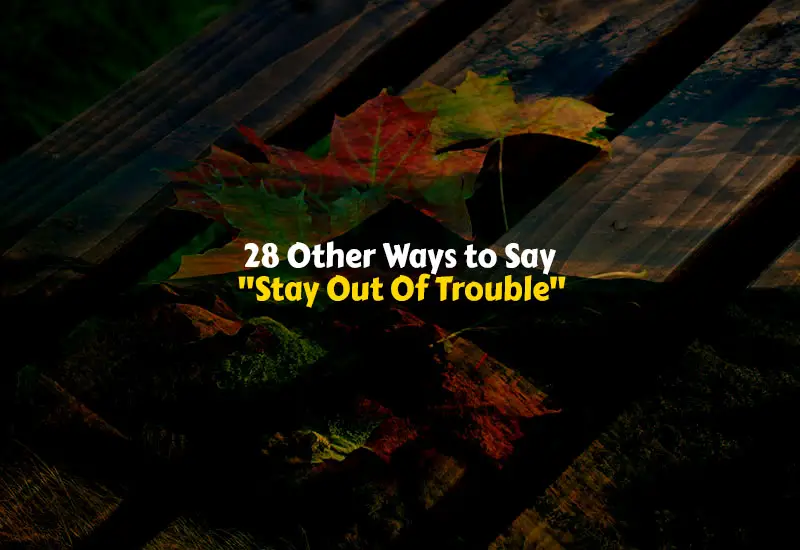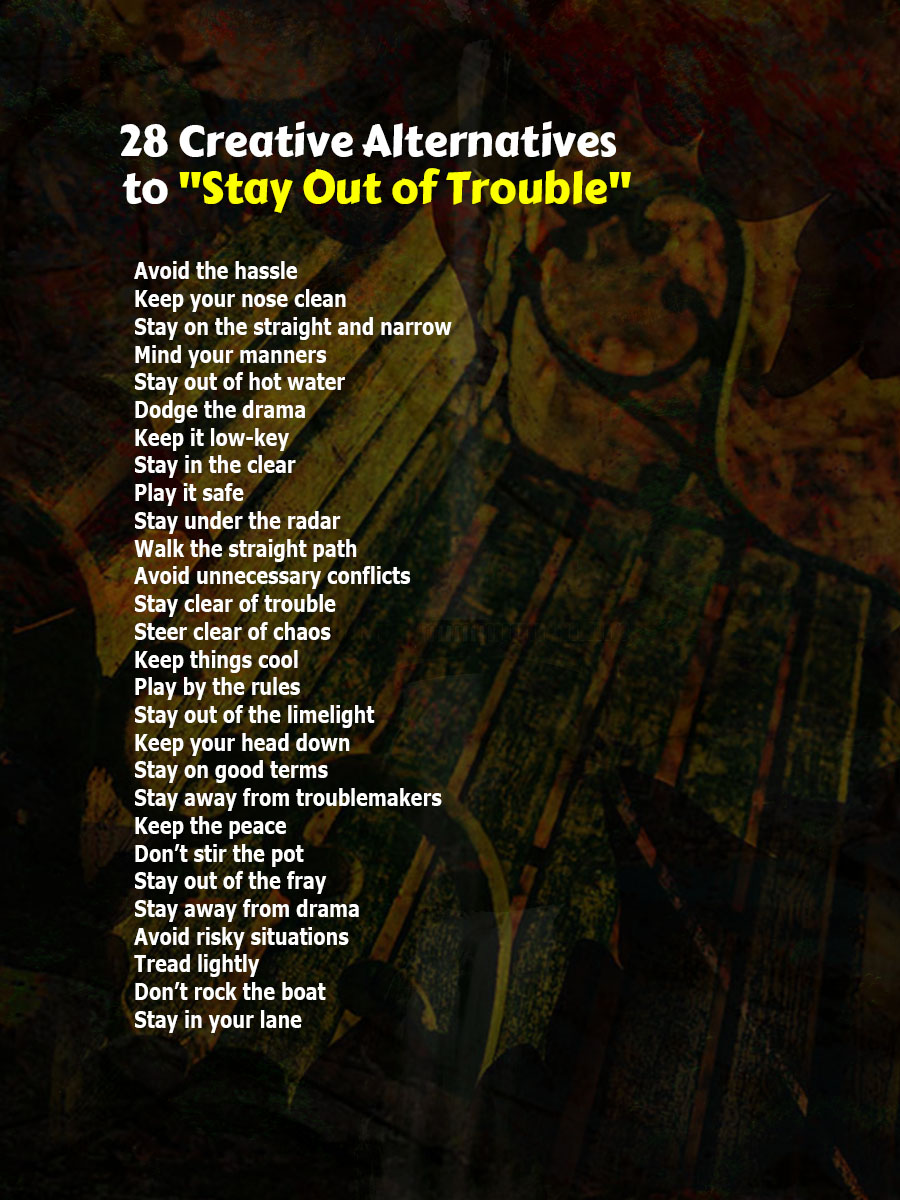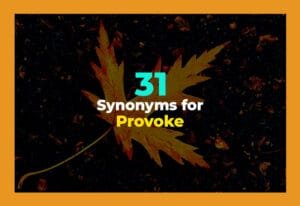Anyone can say “stay out of trouble,” but sometimes it’s fun to use different words. In this blog, we’ll look at other ways to tell someone to be careful. Whether you’re talking to a friend, family member, or even yourself, there are many creative ways to give this advice. From friendly phrases to playful sayings, you’ll find plenty of options to use. So, let’s explore some new and interesting ways to keep things safe and sound without always saying “stay out of trouble.”
28 Other Ways to Say “Stay Out Of Trouble”

Here are 28 different ways to say “Stay out of trouble”:
- Behave yourself.
- Keep your nose clean.
- Be good.
- Mind your manners.
- Stay on the right path.
- Walk the straight and narrow.
- Keep on the straight and narrow.
- Keep your head down.
- Stay out of mischief.
- Keep out of trouble.
- Don’t cause any trouble.
- Stay out of hot water.
- Stay out of the doghouse.
- Stay on the right side of the law.
- Keep yourself in check.
- Stay in line.
- Play it safe.
- Don’t rock the boat.
- Keep it clean.
- Be on your best behavior.
- Don’t get into any messes.
- Stay out of bad situations.
- Keep out of harm’s way.
- Steer clear of trouble.
- Avoid trouble.
- Keep your record clean.
- Stay out of danger.
- Keep yourself out of trouble.
1. Behave yourself
Behaving yourself means acting in a way that is good and respectful. When someone tells you to behave yourself, they want you to follow the rules and be polite. It means not getting into fights, not talking back to adults, and not doing things that might get you into trouble. It also means being kind to others and making good choices. If you behave yourself, people will trust you and like being around you. It is important to think before you act and always try to do the right thing. This will help you stay out of trouble and keep everyone happy.
2. Keep your nose clean
Keeping your nose clean means staying out of trouble and avoiding situations where you might get into trouble. It means following the rules, not doing anything illegal, and making sure you are always doing the right thing. If you keep your nose clean, you won't have to worry about getting into trouble with teachers, parents, or the law. It also means staying away from people who might get you into trouble. By keeping your nose clean, you can focus on the good things in life and not have to worry about the bad stuff.
3. Be good
Being good means making choices that are kind, honest, and respectful. When someone tells you to be good, they want you to act in a way that makes others happy and keeps you out of trouble. This means listening to your parents and teachers, doing your homework, and not fighting with others. Being good also means helping people when they need it and being a friend to those who are lonely. By being good, you make the world a better place and avoid getting into situations that could cause problems for you.
4. Mind your manners
Minding your manners means being polite and respectful to others. It means saying "please" and "thank you," waiting your turn, and not interrupting when someone else is talking. When you mind your manners, people see you as a nice person who is easy to get along with. This can help you make friends and stay out of trouble. It's also important to follow the rules and listen to adults. By minding your manners, you show that you care about others and that you want to do the right thing.
5. Stay on the right path
Staying on the right path means making good choices and not doing things that could lead to trouble. It means focusing on your goals, like doing well in school and being a good person. When you stay on the right path, you avoid situations that could get you into trouble, like hanging out with the wrong crowd or breaking the rules. It's important to think about what you want to achieve and make choices that help you get there. By staying on the right path, you can reach your dreams and avoid problems along the way.
6. Walk the straight and narrow
Walking the straight and narrow means living a life where you follow the rules and make good choices. It means not doing things that could get you into trouble, like breaking the law or being mean to others. When you walk the straight and narrow, you focus on doing what is right and staying out of situations that could cause problems. This can help you have a happy and successful life. It's important to think about your actions and always try to do what is best for you and those around you.
7. Keep on the straight and narrow
Keeping on the straight and narrow means continuing to make good choices and follow the rules. It means staying away from trouble and doing what you know is right. This can include listening to your parents and teachers, being honest, and not getting involved in things that could hurt you or others. By keeping on the straight and narrow, you can avoid getting into trouble and have a better chance of achieving your goals. It's important to stay focused and always try to do the right thing.
8. Keep your head down
Keeping your head down means staying quiet and not drawing attention to yourself, especially in situations where you could get into trouble. It means doing your work, following the rules, and not getting involved in things that could cause problems. When you keep your head down, you avoid being noticed by people who might want to cause trouble for you. This can help you stay out of difficult situations and focus on what is important. By keeping your head down, you can avoid unnecessary problems and stay on track.
9. Stay out of mischief
Staying out of mischief means not doing things that are naughty or could get you into trouble. It means following the rules, listening to adults, and not doing things that you know are wrong. When you stay out of mischief, you avoid getting into trouble with your parents, teachers, or friends. It's important to make good choices and think about how your actions affect others. By staying out of mischief, you can have fun without causing problems for yourself or those around you.
10. Keep out of trouble
Keeping out of trouble means doing things that help you avoid problems and staying away from situations that could cause trouble. It means following the rules, being respectful, and making good choices. When you keep out of trouble, you don't have to worry about getting punished or facing consequences for bad behavior. It's important to think before you act and always try to do what is right. By keeping out of trouble, you can focus on positive things and enjoy life without unnecessary stress.
11. Don't cause any trouble
Not causing any trouble means being careful with your actions and making sure you don't do anything that could cause problems for yourself or others. It means being respectful, following the rules, and thinking about how your actions affect those around you. When you don't cause any trouble, people trust you and you don't have to worry about getting into trouble. It's important to be mindful of what you do and always try to make good choices. By not causing any trouble, you can have a peaceful and happy life.
12. Stay out of hot water
Staying out of hot water means avoiding situations where you could get into trouble or face consequences. It means being careful with your actions, following the rules, and not doing things that could cause problems. When you stay out of hot water, you don't have to worry about getting punished or facing difficulties because of bad choices. It's important to think about what you do and make sure you are making good decisions. By staying out of hot water, you can avoid stress and enjoy life more.
13. Stay out of the doghouse
Staying out of the doghouse means avoiding actions that could make someone upset with you or get you into trouble. It means being respectful, following the rules, and making sure you don't do anything that could cause problems for yourself or others. When you stay out of the doghouse, people are happy with you and you don't have to worry about getting into trouble. It's important to be mindful of your actions and always try to make good choices. By staying out of the doghouse, you can have better relationships and a more peaceful life.
14. Stay on the right side of the law
Staying on the right side of the law means following the rules and not doing anything illegal. It means making sure your actions are within the boundaries of what is allowed and not breaking any laws. When you stay on the right side of the law, you avoid getting into trouble with the police and facing legal consequences. It's important to know what the rules are and make sure you follow them. By staying on the right side of the law, you can live a safer and more secure life.
15. Keep yourself in check
Keeping yourself in check means being aware of your actions and making sure you don't do anything that could get you into trouble. It means thinking before you act, being responsible, and making good choices. When you keep yourself in check, you avoid situations that could cause problems for you or others. It's important to stay in control of your behavior and always try to do what is right. By keeping yourself in check, you can avoid trouble and have a more peaceful and successful life.
16. Stay in line
Staying in line means following the rules and doing what is expected of you. It means not doing anything that could get you into trouble or cause problems for others. When you stay in line, you make good choices and avoid situations that could lead to trouble. It's important to know what the rules are and make sure you follow them. By staying in line, you can avoid unnecessary problems and have a better chance of achieving your goals.
17. Play it safe
Playing it safe means being careful with your actions and not taking risks that could get you into trouble. It means making good choices, following the rules, and avoiding situations that could cause problems. When you play it safe, you avoid getting into trouble and facing negative consequences. It's important to think about what you do and make sure you are making decisions that keep you safe and out of trouble. By playing it safe, you can enjoy life without unnecessary stress.
18. Don't rock the boat
Not rocking the boat means not doing anything that could cause trouble or upset others. It means being respectful, following the rules, and making sure you don't do anything that could create problems. When you don't rock the boat, people are happy with you and you avoid getting into trouble. It's important to be mindful of your actions and always try to make good choices. By not rocking the boat, you can have better relationships and a more peaceful life.
19. Keep it clean
Keeping it clean means making sure your actions are good and not doing anything that could get you into trouble. It means being respectful, following the rules, and making good choices. When you keep it clean, you avoid situations that could cause problems for yourself or others. It's important to think about what you do and make sure you are doing the right thing. By keeping it clean, you can avoid trouble and have a happier and more successful life.
20. Be on your best behavior
Being on your best behavior means acting in a way that is good and respectful, especially when you are in important situations or with important people. It means following the rules, being polite, and making good choices. When you are on your best behavior, people see you as a nice person and you avoid getting into trouble. It's important to think about how your actions affect others and always try to do what is right. By being on your best behavior, you can make a good impression and stay out of trouble.
21. Don't get into any messes
Not getting into any messes means avoiding situations that could cause trouble or problems for you. It means being careful with your actions, following the rules, and making good choices. When you don't get into any messes, you avoid getting into trouble and facing negative consequences. It's important to think before you act and make sure you are making decisions that keep you safe and out of trouble. By not getting into any messes, you can enjoy life without unnecessary stress.
22. Stay out of bad situations
Staying out of bad situations means avoiding places or people that could lead to trouble. It means making good choices, following the rules, and being careful with your actions. When you stay out of bad situations, you avoid getting into trouble and facing negative consequences. It's important to think about where you go and who you spend time with to make sure you are safe. By staying out of bad situations, you can have a happier and more peaceful life.
23. Keep out of harm's way
Keeping out of harm's way means avoiding situations that could be dangerous or get you into trouble. It means being careful with your actions, following the rules, and making sure you are safe. When you keep out of harm's way, you avoid getting hurt or getting into trouble. It's important to think about what you do and make sure you are making good choices. By keeping out of harm's way, you can stay safe and enjoy life more.
24. Steer clear of trouble
Steering clear of trouble means avoiding situations or people that could get you into trouble. It means making good choices, following the rules, and being careful with your actions. When you steer clear of trouble, you avoid getting into bad situations and facing negative consequences. It's important to think about where you go and who you spend time with to make sure you are safe. By steering clear of trouble, you can have a happier and more peaceful life.
25. Avoid trouble
Avoiding trouble means staying away from situations that could cause problems for you. It means being careful with your actions, following the rules, and making good choices. When you avoid trouble, you don't have to worry about getting into trouble or facing negative consequences. It's important to think before you act and make sure you are making decisions that keep you safe and out of trouble. By avoiding trouble, you can enjoy life without unnecessary stress.
26. Keep your record clean
Keeping your record clean means not doing anything that could get you into trouble or cause problems that stay with you. It means making good choices, following the rules, and being careful with your actions. When you keep your record clean, you avoid getting into trouble and facing negative consequences that could affect your future. It's important to think about what you do and make sure you are doing the right thing. By keeping your record clean, you can have a better chance of achieving your goals and staying out of trouble.
27. Stay out of danger
Staying out of danger means avoiding situations that could be risky or get you into trouble. It means being careful with your actions, following the rules, and making sure you are safe. When you stay out of danger, you avoid getting hurt or getting into trouble. It's important to think about what you do and make sure you are making good choices. By staying out of danger, you can stay safe and enjoy life more.
28. Keep yourself out of trouble
Keeping yourself out of trouble means making sure you don't do anything that could cause problems for you. It means being careful with your actions, following the rules, and making good choices. When you keep yourself out of trouble, you avoid getting into bad situations and facing negative consequences. It's important to think before you act and make sure you are making decisions that keep you safe and out of trouble. By keeping yourself out of trouble, you can enjoy life without unnecessary stress.
Best Responses to “Stay Out of Trouble”
Here are 28 simple responses to help you stay out of trouble in various situations:
- I didn’t know that, but I’ll find out.
- I’m sorry if I upset you. That wasn’t my intention.
- Let me get back to you on that.
- Thanks for letting me know. I’ll keep that in mind.
- I understand how you feel.
- Can we talk about this later?
- I appreciate your feedback.
- I apologize. It won’t happen again.
- I’ll make sure to fix that.
- Let’s find a solution together.
- I didn’t mean to cause any issues.
- Can you explain that to me?
- I’m willing to compromise.
- Your opinion matters to me.
- Let’s take a break and revisit this.
- Can we agree to disagree?
- I’m here to help.
- I see your point.
- Thank you for your patience.
- I’ll handle it from here.
- What can I do to make this right?
- I’m learning from this experience.
- Let’s focus on moving forward.
- I value our relationship.
- Is there anything else you need?
- I respect your decision.
- Let’s keep an open mind.
- Can we start fresh?
I didn’t know that, but I’ll find out.
When someone tells you something you don't know, it's okay to admit it. Saying, “I didn’t know that, but I’ll find out,” shows that you are willing to learn. This response helps keep the conversation going in a positive way. It also shows that you respect the other person’s knowledge and are open to new information. Asking for help or clarification is a good way to avoid misunderstandings. Plus, it can make the other person feel valued because you care enough to seek the truth.
I’m sorry if I upset you. That wasn’t my intention.
If someone is upset with you, it is important to address their feelings. Saying, “I’m sorry if I upset you. That wasn’t my intention,” shows that you care about their feelings. This response is honest and allows the person to express themselves. It helps to calm the situation and makes it clear that you did not mean to hurt them. Acknowledging their feelings can help build trust and make it easier to resolve any issues. This way, both of you can move on positively.
Let me get back to you on that.
Sometimes, you might not have an answer right away. Saying, “Let me get back to you on that,” is a polite way to say you need more time to think. This shows that you want to provide a thoughtful response instead of giving an answer you are unsure about. It also sets clear expectations, letting the other person know you care enough to follow up. This approach can help avoid misunderstandings and gives you time to gather the necessary information. It keeps the lines of communication open for further discussion.
Thanks for letting me know. I’ll keep that in mind.
When someone shares important information with you, it's nice to acknowledge it. Saying, “Thanks for letting me know. I’ll keep that in mind,” shows appreciation. It lets the other person know that you value their input. This response also builds a positive connection, encouraging more open communication in the future. Keeping their advice in mind helps you to avoid similar issues later on. It also shows that you are responsible and willing to learn from others, making your relationships stronger.
I understand how you feel.
When someone is sharing their feelings, it can be very comforting to hear, “I understand how you feel.” This response shows empathy, which means you can relate to their emotions. It helps create a safe space for them to express themselves. By acknowledging their feelings, you show that you care. This response can also help calm tensions and encourage open discussion. It shows that you are not just listening, but you are also trying to understand their perspective. This can lead to better communication and stronger relationships.
Can we talk about this later?
If a conversation is getting too heated or complicated, saying, “Can we talk about this later?” is a great way to cool things down. It shows that you are not ignoring the issue but want to discuss it when both of you are calmer. This response can help prevent misunderstandings and arguments. It also gives both parties time to think about their thoughts and feelings before talking again. Waiting allows you to approach the issue with a clearer mind and can lead to a more productive conversation.
I appreciate your feedback.
When someone gives you their thoughts or opinions, it's important to recognize their effort. Saying, “I appreciate your feedback,” shows that you value their input. This response encourages them to share more in the future and helps create a positive environment for communication. It also shows that you are open to improvement and willing to listen. By expressing gratitude, you build trust and respect in your relationship. This can lead to more open discussions and help both of you grow together.
I apologize. It won’t happen again.
When you realize you made a mistake, it's important to take responsibility. Saying, “I apologize. It won’t happen again,” shows that you are sincere in your regret. This response helps repair any damage and reassures the other person that you will learn from the situation. Acknowledging your mistake can lead to forgiveness and a stronger relationship. It also shows maturity and a willingness to improve. This approach can help clear the air and allows both parties to move forward positively without holding onto negativity.
I’ll make sure to fix that.
If something is wrong and you can help, saying, “I’ll make sure to fix that,” shows you are willing to take action. This response shows that you care about making things right. It reassures the other person that you are responsible and willing to help. Taking steps to fix the issue can prevent future problems and helps build trust. It also demonstrates that you are committed to improving the situation. This positive attitude can lead to a more cooperative and supportive relationship.
Let’s find a solution together.
When facing a problem, suggesting, “Let’s find a solution together,” is a great way to collaborate. This response shows that you are open to teamwork and value the other person’s input. Working together to solve a problem can lead to better outcomes and strengthens your relationship. It encourages open communication and shows that you care about finding a resolution that works for both of you. This approach fosters a sense of partnership and makes it easier to tackle challenges together.
I didn’t mean to cause any issues.
If someone is upset due to something you did, saying, “I didn’t mean to cause any issues,” shows that you recognize the problem. This response expresses that your intentions were not harmful. It helps clarify that you were not trying to create conflict. This statement can help ease the tension and open the door for further discussion. By acknowledging the situation, you can work towards finding a solution together. It shows that you value the relationship and want to resolve any misunderstandings.
Can you explain that to me?
If you don't understand something, asking, “Can you explain that to me?” is a good approach. This response shows that you are interested in learning and value the other person’s knowledge. It encourages them to share more information and helps clear up confusion. By seeking clarification, you can avoid making mistakes based on misunderstandings. This approach promotes open communication and shows that you are willing to engage with the topic. It can lead to a more informed discussion and strengthen your relationship.
I’m willing to compromise.
When two sides have different views, saying, “I’m willing to compromise,” shows that you are open to finding a middle ground. This response encourages collaboration and helps both parties feel heard. It shows that you care about the relationship and are willing to adjust your stance for mutual benefit. Compromise can help prevent arguments and fosters understanding. This approach creates a more positive environment and can lead to better outcomes for both sides. It emphasizes teamwork and can strengthen your connection.
Your opinion matters to me.
If someone shares their thoughts, saying, “Your opinion matters to me,” shows that you value their input. This response helps build trust and encourages open communication. By acknowledging their perspective, you create a space where they feel comfortable sharing more. It shows that you respect their feelings and want to include them in decisions. This approach can strengthen your relationship and lead to better collaboration in the future. It emphasizes the importance of each person’s voice in a discussion.
Let’s take a break and revisit this.
If a conversation is becoming too intense, saying, “Let’s take a break and revisit this,” is wise. This response helps prevent arguments and allows both parties to cool off. Taking a break can provide time to think about what was discussed and come back with clearer minds. It shows that you are serious about finding a resolution but need a moment to process. This approach can lead to more productive discussions and help maintain a positive relationship between you and the other person.
Can we agree to disagree?
Sometimes, it’s okay to have different opinions. Saying, “Can we agree to disagree?” is a respectful way to acknowledge those differences. This response helps avoid heated arguments and shows that you respect each other’s views. It allows both parties to maintain their beliefs without conflict. This approach encourages understanding and keeps the conversation civil. By recognizing that it is fine to disagree, you can strengthen your relationship and focus on finding common ground in other areas.
I’m here to help.
If someone is struggling, offering, “I’m here to help,” shows that you care. This response lets them know they are not alone and can lean on you for support. It encourages open communication and strengthens your bond. By offering your help, you show kindness and a willingness to be there for them. This attitude fosters trust and makes it easier for others to reach out in the future. It demonstrates that you value the relationship and want to contribute positively to their situation.
I see your point.
When someone makes a valid argument, saying, “I see your point,” shows that you are listening and understanding their perspective. This response encourages open dialogue and fosters respect. Acknowledging the other person’s viewpoint helps build trust and shows that you are open to considering different ideas. It can lead to more productive conversations and can help find common ground. By recognizing their perspective, you can strengthen your relationship and create a more positive atmosphere for discussion.
Thank you for your patience.
If someone is being understanding, saying, “Thank you for your patience,” shows that you appreciate their support. This response helps build a positive connection and encourages them to continue being patient. It acknowledges their effort to remain calm, which can strengthen your relationship. By expressing gratitude, you create an environment of respect and understanding. This approach fosters open communication and can lead to better collaboration in the future. It makes both parties feel valued and understood.
I’ll handle it from here.
If someone is concerned about a situation, saying, “I’ll handle it from here,” shows confidence and responsibility. This response reassures them that you are taking charge and will work to resolve any issues. It builds trust by letting them know you care about the outcome. By taking responsibility, you can alleviate their worries and strengthen your relationship. This approach also encourages open communication, as you can keep them updated on your progress. It shows you value their input while assuring them that the matter is in good hands.
What can I do to make this right?
When a mistake happens, asking, “What can I do to make this right?” shows that you are serious about fixing the problem. This response demonstrates accountability and a willingness to take action. It opens the door for the other person to share their thoughts on how to improve the situation. By seeking their input, you show respect and make them feel heard. This collaborative approach can help rebuild trust and strengthen your relationship. It shows that you genuinely care about their feelings and the outcome.
I’m learning from this experience.
When you face a challenge or mistake, saying, “I’m learning from this experience,” shows growth. This response highlights your willingness to improve and adapt. Acknowledging that you are learning helps create a positive mindset and encourages others to see mistakes as opportunities. This attitude fosters a supportive environment, where everyone can grow together. By sharing your growth, you can inspire others to learn from their experiences too. This approach strengthens relationships by emphasizing understanding and progress rather than blame.
Let’s focus on moving forward.
When discussing a past issue, saying, “Let’s focus on moving forward,” encourages a positive outlook. This response shows that you want to leave the past behind and work toward a better future. It emphasizes growth and collaboration, helping both parties feel more optimistic. By focusing on solutions, you can strengthen your relationship and foster teamwork. This approach creates an environment where everyone feels encouraged to share ideas and work together toward common goals. It helps avoid dwelling on negative feelings and promotes a positive mindset.
I value our relationship.
When things get tough, saying, “I value our relationship,” shows how much you care. This response emphasizes the importance of your connection and can help ease tensions. It reminds both parties that the relationship matters more than the current issue. By expressing this sentiment, you create a safe space for open dialogue and understanding. This approach encourages both parties to work together to resolve conflicts. It helps strengthen your bond and shows that you are committed to maintaining a positive relationship.
Is there anything else you need?
If someone is struggling or needs assistance, asking, “Is there anything else you need?” shows that you are willing to help. This response encourages open communication and demonstrates your support. By offering further assistance, you make them feel valued and understood. This attitude fosters a positive environment where they feel comfortable reaching out for help. It strengthens your relationship by showing that you care about their well-being. This approach emphasizes teamwork and builds trust between both parties.
I respect your decision.
When someone makes a choice, saying, “I respect your decision,” shows that you acknowledge their autonomy. This response demonstrates maturity and understanding, even if you don't fully agree with their choice. By expressing respect, you help maintain a positive relationship and create a safe space for open dialogue. This approach fosters trust and encourages them to share their thoughts with you in the future. It emphasizes that you value their perspective, which can lead to stronger connections and better communication over time.
Let’s keep an open mind.
When discussing differing opinions, suggesting, “Let’s keep an open mind,” encourages flexibility. This response shows that you are willing to consider different viewpoints. By promoting an open-minded attitude, you create a positive environment for discussion. It helps reduce tension and encourages respectful dialogue. This approach fosters understanding and can lead to new insights. It shows that you value the relationship and want to explore ideas together. By keeping an open mind, both parties can grow and learn from each other.
Can we start fresh?
If past issues are weighing on a relationship, saying, “Can we start fresh?” is a way to reset. This response shows a desire to move forward without lingering negativity. It emphasizes a positive attitude and a commitment to improving the relationship. By expressing this wish, you create a safe space for both parties to let go of past grievances. This approach encourages open communication and allows for a more positive connection. It can lead to stronger bonds and a healthier relationship overall.

I hope this list helps you understand different ways to say “stay out of trouble.” By following these ideas, you can make good choices and avoid problems. Remember to be respectful, think before you act, and stay away from situations that could lead to trouble. Living this way can make your life happier and more peaceful.









